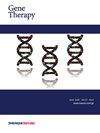AAV microdystrophin gene replacement therapy for Duchenne muscular dystrophy: progress and prospects
IF 4.5
3区 医学
Q1 BIOCHEMISTRY & MOLECULAR BIOLOGY
引用次数: 0
Abstract
Duchenne muscular dystrophy (DMD) is caused by pathogenic sequence variants occurring in the DMD gene which lead to the loss of the dystrophin protein, a molecular ‘shock absorber’ that protects muscle from contraction-induced injury. The large size of the dystrophin open reading frame precludes delivery of the full-length protein using a single adeno-associated virus (AAV) vector, which led to the development of internally-deleted dystrophin minigenes encoding partially-functional dystrophin. Indeed, five such microdystrophin therapies have been assessed in various clinical programmes. In 2023, Elevidys (Sarepta Therapeutics) received accelerated approval based on levels of dystrophin as a surrogate biomarker. In 2024, it received full approval despite unclear efficacy (i.e. not meeting primary or secondary outcomes in a phase 3 trial). Additionally, in 2025, two DMD individuals treated with Elevidys died after acute liver failure. A separate microdystrophin therapy, PF-06939926 (Pfizer) was discontinued for both efficacy and safety reasons (including the deaths of two clinical trial participants). Solid Biosciences, Genethon, REGENXBIO, and Insmed continue to develop microdystrophin therapies differing in transgene structure, promoter sequences, and AAV serotype. Here we describe recent progress in AAV-microdystrophin therapeutics development, and discuss the challenges facing such approaches, including pre-existing anti-capsid immunity, anti-transgene immunity, the unknown functionality of microdystrophin transgenes, transduction of muscle stem cells, and long-term transgene persistence.

AAV微营养不良蛋白基因替代治疗杜氏肌营养不良:进展与展望。
杜氏肌营养不良症(DMD)是由DMD基因中发生的致病性序列变异引起的,这种变异导致肌营养不良蛋白的丧失,而肌营养不良蛋白是一种保护肌肉免受收缩性损伤的分子“减震器”。大尺寸的肌营养不良蛋白开放阅读框阻碍了使用单个腺相关病毒(AAV)载体传递全长蛋白,这导致内部缺失的编码部分功能肌营养不良蛋白的肌营养不良蛋白小基因的发展。事实上,在各种临床方案中已经评估了五种微营养不良蛋白疗法。2023年,基于抗营养不良蛋白(dystrophin)作为替代生物标志物的水平,eleidys (Sarepta Therapeutics)获得了加速批准。2024年,尽管疗效不明确(即在3期试验中未达到主要或次要结果),但它获得了全面批准。此外,在2025年,两名接受eleidys治疗的DMD患者死于急性肝衰竭。另一种微营养不良蛋白治疗PF-06939926(辉瑞)因疗效和安全性原因(包括两名临床试验参与者的死亡)被停止。Solid Biosciences、Genethon、REGENXBIO和Insmed继续开发不同转基因结构、启动子序列和AAV血清型的微营养不良蛋白疗法。在这里,我们描述了aav -微营养不良蛋白治疗方法的最新进展,并讨论了这些方法面临的挑战,包括预先存在的抗衣壳免疫、抗转基因免疫、微营养不良蛋白转基因的未知功能、肌肉干细胞的转导以及转基因的长期持久性。
本文章由计算机程序翻译,如有差异,请以英文原文为准。
求助全文
约1分钟内获得全文
求助全文
来源期刊

Gene Therapy
医学-生化与分子生物学
CiteScore
9.70
自引率
2.00%
发文量
67
审稿时长
4-8 weeks
期刊介绍:
Gene Therapy covers both the research and clinical applications of novel therapeutic techniques based on a genetic component. Over the last few decades, significant advances in technologies ranging from identifying novel genetic targets that cause disease through to clinical studies, which show therapeutic benefit, have elevated this multidisciplinary field to the forefront of modern medicine.
 求助内容:
求助内容: 应助结果提醒方式:
应助结果提醒方式:


